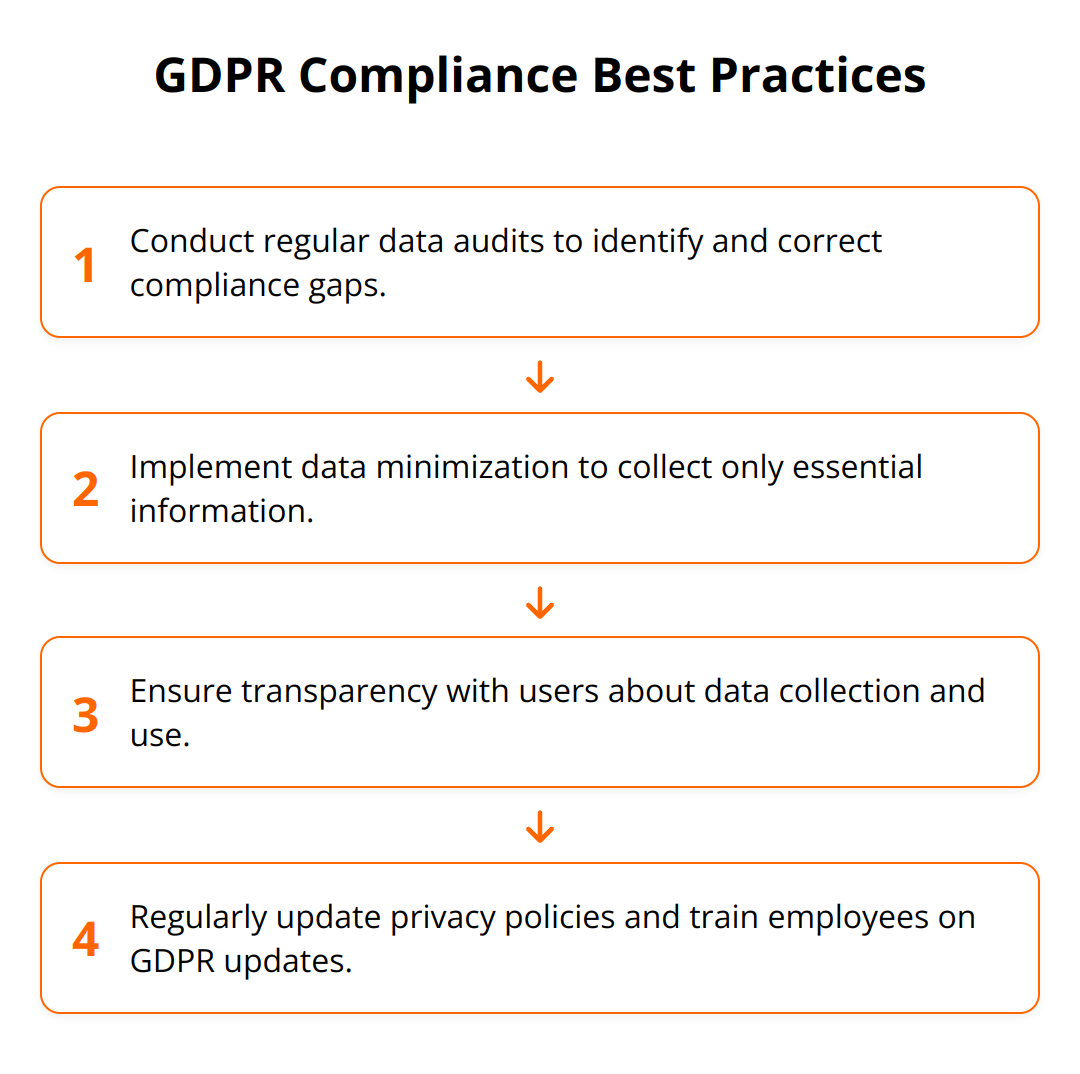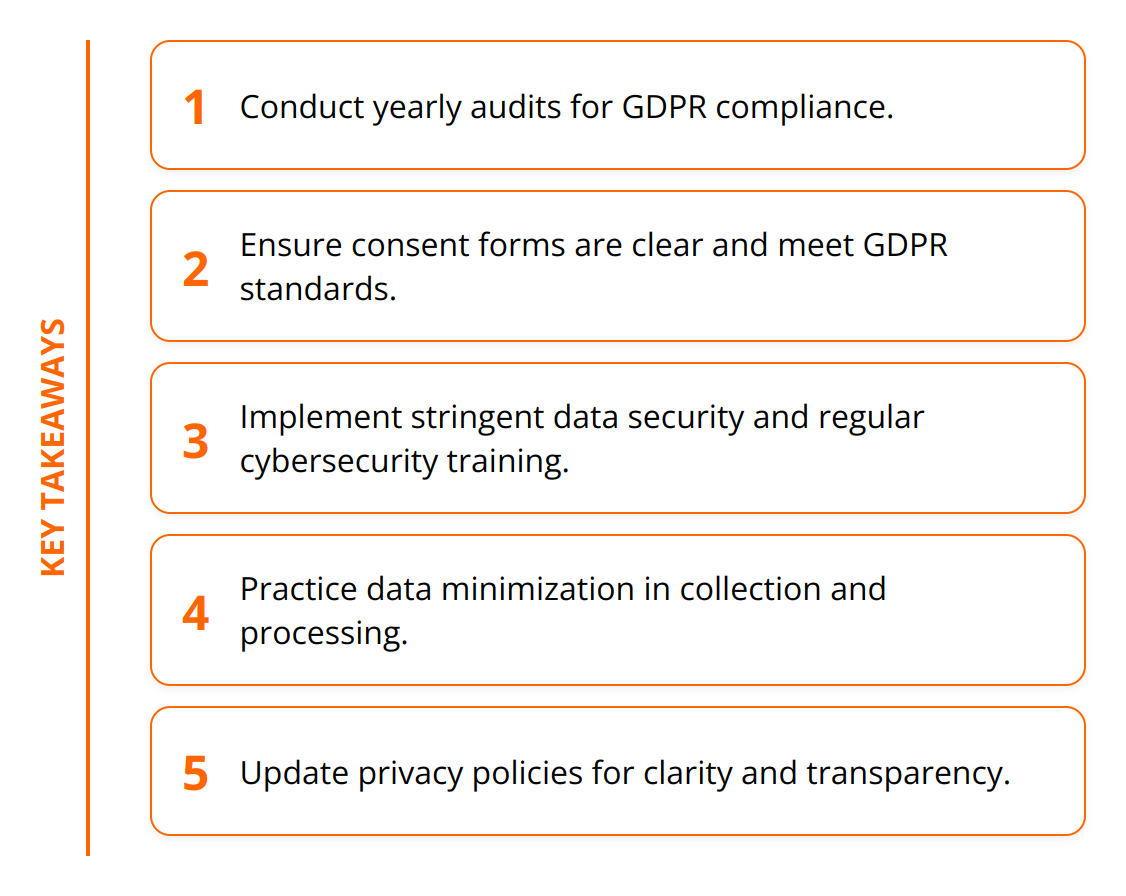
At Reward the World, we understand the importance of safeguarding our users’ data, particularly within the framework of GDPR. This regulation has significantly changed how reward programs operate, emphasizing the need for strict data protection measures. Ensuring GDPR compliance is not just a legal necessity; it’s a cornerstone of customer trust. Through this blog post, we aim to shed light on the critical aspects of GDPR compliance and its essential role in the success of reward programs.
Why GDPR Matters for Rewards
The General Data Protection Regulation (GDPR) is a game-changer in how data is collected, stored, and processed. For reward programs, adherence and understanding of GDPR are non-negotiable. The regulation affects every aspect of collecting and handling personal data, signaling a significant shift towards ensuring consumer privacy and trust. Building customer trust is not an option; it’s a must for the survival and growth of any reward program.

GDPR has brought to light several key principles critical for reward programs. Firstly, data must be processed lawfully, fairly, and transparently, putting the power back in the hands of the consumers. Consent must be freely given and can be as easily withdrawn. The notion of data minimization also plays a pivotal role, ensuring that only necessary data is collected. These principles not only safeguard customer data but also reinforce the importance of transparency and trust in customer relationships.
For reward programs, GDPR compliance is a direct route to building and maintaining customer trust. In an era where data breaches are not uncommon, a program’s ability to demonstrate robust data protection measures can set it apart. Trust becomes the currency for customer loyalty, more valuable than any reward a program can offer. Customers are increasingly savvy about their data rights and will favor programs that respect and protect their privacy.

Practical steps to ensure GDPR compliance include:
- Reviewing and updating privacy policies to make them more understandable
- Implementing and documenting a clear consent mechanism
- Training staff on data protection and privacy procedures
- Establishing a clear process for data access requests
A commitment to GDPR is not just about regulatory compliance; it’s about winning and retaining customer trust. In the competitive landscape of reward programs, being GDPR compliant is a badge of honor that demonstrates a program’s dedication to privacy, setting the foundation for long-lasting customer relationships.
For more insights on integrating GDPR compliance in reward strategies, consider exploring our guide on personalized reward strategies.
GDPR’s Effect on Rewards
The integration of the General Data Protection Regulation (GDPR) into reward programs marks a significant shift in the landscape of data handling and customer interaction. With the GDPR coming into full force, reward programs have undergone monumental changes, primarily in data collection, obtaining explicit consent, and fortifying data security measures.
With the stringent norms set by GDPR, data collection and usage practices have had to evolve. Businesses can no longer collect data indiscriminately. Data minimization is at the heart of GDPR, meaning only necessary data essential for the program’s operation should be collected. It requires a granular understanding of what data is genuinely needed and ensuring systems are in place to manage this data responsibly. This shift necessitates a detailed inventory of data flows within reward programs, identifying where data is sourced from, how it is used, and when it is disposed of.
The requirement for explicit consent under GDPR cannot be overstated. Consent forms now need to be clear, straightforward, and devoid of any legal jargon. This clarity ensures that customers are fully informed about what they are agreeing to. It’s not enough to just have consent; this consent must be verifiable and easily withdrawable at any time by the customer. Creating a consent mechanism that is both user-friendly and compliant is no small feat but paramount for adherence to GDPR regulations. Reward programs have had to redesign their sign-up processes to incorporate these elements, ensuring that the consent obtained is GDPR-compliant.
Enhancing data security measures has become an indispensable pillar of GDPR compliance for reward programs. With GDPR, it’s not enough to just collect and use data responsibly; this data must be protected with the highest security standards to prevent data breaches. Investing in state-of-the-art cybersecurity measures and encryption technologies is no longer optional but a fundamental requirement. Regular audits and updates of these security practices ensure that reward programs remain impervious to evolving cyber threats.

In light of these changes, here are practical steps that can be immediately implemented:
- Conduct a data audit to identify all data processing activities.
- Simplify and clarify consent forms, making sure they meet GDPR standards.
- Upgrade security protocols and implement regular cybersecurity training for staff.
- Develop a transparent data access request process for customers.
Adapting to GDPR has undoubtedly challenged reward programs, necessitating significant investments in time and resources. However, these investments are not without their benefits. They have led to more robust, transparent, and trust-based relationships with customers. For reward programs looking to align with GDPR and bolster their privacy frameworks, exploring comprehensive guides like the data residency considerations can provide deeper insights and actionable steps.
The journey towards GDPR compliance is a continuous one, with ongoing learning and improvements. While it may seem daunting, the benefits of building a GDPR-compliant reward program — in terms of both regulatory compliance and enhanced customer trust — are invaluable.
Optimizing GDPR Compliance
Adhering to the GDPR regulation necessitates a proactive approach, focusing on genuine data integrity within reward programs. One essential practice is conducting regular data audits. This process involves systematically examining and assessing how personal data is handled – from collection through to destruction. Audits serve as a critical tool, enabling programs to identify potential compliance gaps and take corrective action. Additionally, they help in understanding the flow of data, thus making it easier to safeguard against breaches.
Data minimization stands out as a fundamental principle of GDPR. The core idea is to collect only what is absolutely necessary for the function of the reward program. This approach does not only comply with legal requirements but also streamlines operations and enhances data security. Employing data minimization can often require a shift in mindset but adopting this principle demonstrates a clear commitment to user privacy and data protection.
Transparency with users is non-negotiable. Reward programs must ensure that individuals understand what data is being collected, why it’s collected, and how it will be used. This includes detailing data usage in clear, accessible privacy policies and explicit consent forms. Providing users with easy access to their own data and a straightforward process for modifying or deleting their information is also pivotal. Transparency isn’t merely a regulatory requirement—it’s foundational to building and maintaining trust.
In this ever-evolving landscape, understanding and implementing these practices is vital for any reward program aiming to stay ahead. For deeper insights into creating robust reward strategies within GDPR guidelines, exploring market research rewards can offer valuable information.
Practical steps include:
- Schedule yearly audits to assess GDPR compliance.
- Review data collection practices to align with minimization principles.
- Update privacy policies to ensure clarity and accessibility.
- Regularly train employees on GDPR best practices and updates.

By embedding these practices into the operational fabric of reward programs, businesses can navigate GDPR’s complexities effectively. More importantly, they cement a culture of respect and protection around user data, which is paramount in today’s digital era.
Wrapping Up
Throughout this exploration of GDPR and its profound impact on reward programs, a few critical insights stand out. GDPR is not just a regulatory hurdle; it’s a foundation for trust and integrity in the digital economy. For reward programs, this means incorporating lawful data processing, explicit consent, data minimization, and robust data security measures into their operational DNA. These principles ensure not only compliance but also fortify customer trust and loyalty, which are invaluable assets in today’s competitive landscape.

The importance of GDPR compliance cannot be overstated. It acts as a badge of honor, signaling a program’s commitment to respecting and protecting user data. This commitment is essential for fostering long-term customer relationships and maintaining a positive brand reputation. Moreover, GDPR compliance is a dynamic process, requiring continuous vigilance to adapt to evolving regulations and data protection standards.
We encourage reward programs to adopt a proactive stance towards GDPR compliance. Regular audits, transparent communication, staff training, and embracing data minimization are vital steps in this journey. Moreover, leveraging comprehensive platforms like Reward the World can provide the necessary tools and insights to seamlessly integrate GDPR-compliant practices into your reward strategies. With its global reach, multilingual support, and commitment to GDPR compliance, Reward the World is well-positioned to assist businesses in enhancing their reward programs while adhering to stringent data protection standards.
In conclusion, GDPR compliance is an ongoing journey marked by a commitment to data integrity and user privacy. By taking proactive steps and leveraging the right resources, reward programs can navigate this landscape effectively, enhancing both compliance and customer trust. Let’s continue to prioritize the protection and respect of user data, laying a strong foundation for the future of rewards.
